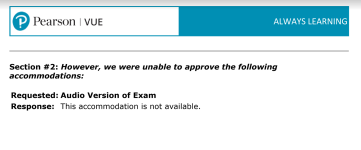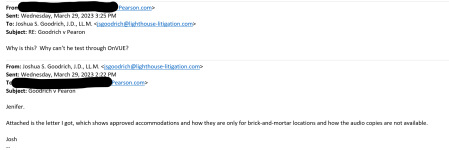I am looking to find out how many people have students or themselves have problems with Pearson Vue and Accommodations issues. I am getting ready to draft a demand to PearonVue on this matter.
It seems to me that Pearson is violating the ADA on several levels.
PersonVue refuses to allow accommodation on the at-home testing platform PerasonVue Online Testing. This is a direct violation of the ADA under Title III. People with disabilities are barred from the PearonVue Online Testing platform. People with mobility disabilities are forced to go to a testing center, leave their homes, get rides to the testing centers, go to some testing centers that are not ADA compliant, then test in public. At the same time, people without disabilities are allowed to test anywhere.
"The ADA requires that any person offering examinations related to post-secondary education or profession “shall offer such examinations or courses in a place and manner accessible to persons with disabilities.” 42 U.S.C. § 12189. Regulations interpreting this section to impose an obligation on the entity offering such an examination that “ [t]he examination is selected and administered so as to best ensure that, when the examination is administered to an individual with a disability that impairs sensory, manual, or speaking skills, the examination results accurately reflect the individual's aptitude or achievement level or whatever other factor the examination purports to measure, rather than reflecting the individual‟s impaired sensory, manual, or speaking skills.” 28 C.F.R. § 36.309."
The ADA makes it unlawful to “coerce, intimidate, threaten, or interfere with any individual in the exercise or enjoyment of, or on account of his or her having exercised or enjoyed, any right granted or protected by this Act.” 42 U.S.C. § 12203.
The ADA requires that any person offering examinations related to post-secondary education or profession “shall offer such examinations or courses in a place and manner accessible to persons with disabilities.” 42 U.S.C. § 12189. As part of this duty to make an examination accessible, the regulations require that any documentation requested be “reasonable and limited to the need for the modification, accommodation, or auxiliary aid or service requested.” 28 C.F.R. § 36.309(b)(1)(iv).
It seems to me that Pearson is violating the ADA on several levels.
PersonVue refuses to allow accommodation on the at-home testing platform PerasonVue Online Testing. This is a direct violation of the ADA under Title III. People with disabilities are barred from the PearonVue Online Testing platform. People with mobility disabilities are forced to go to a testing center, leave their homes, get rides to the testing centers, go to some testing centers that are not ADA compliant, then test in public. At the same time, people without disabilities are allowed to test anywhere.
"The ADA requires that any person offering examinations related to post-secondary education or profession “shall offer such examinations or courses in a place and manner accessible to persons with disabilities.” 42 U.S.C. § 12189. Regulations interpreting this section to impose an obligation on the entity offering such an examination that “ [t]he examination is selected and administered so as to best ensure that, when the examination is administered to an individual with a disability that impairs sensory, manual, or speaking skills, the examination results accurately reflect the individual's aptitude or achievement level or whatever other factor the examination purports to measure, rather than reflecting the individual‟s impaired sensory, manual, or speaking skills.” 28 C.F.R. § 36.309."
The ADA makes it unlawful to “coerce, intimidate, threaten, or interfere with any individual in the exercise or enjoyment of, or on account of his or her having exercised or enjoyed, any right granted or protected by this Act.” 42 U.S.C. § 12203.
The ADA requires that any person offering examinations related to post-secondary education or profession “shall offer such examinations or courses in a place and manner accessible to persons with disabilities.” 42 U.S.C. § 12189. As part of this duty to make an examination accessible, the regulations require that any documentation requested be “reasonable and limited to the need for the modification, accommodation, or auxiliary aid or service requested.” 28 C.F.R. § 36.309(b)(1)(iv).



